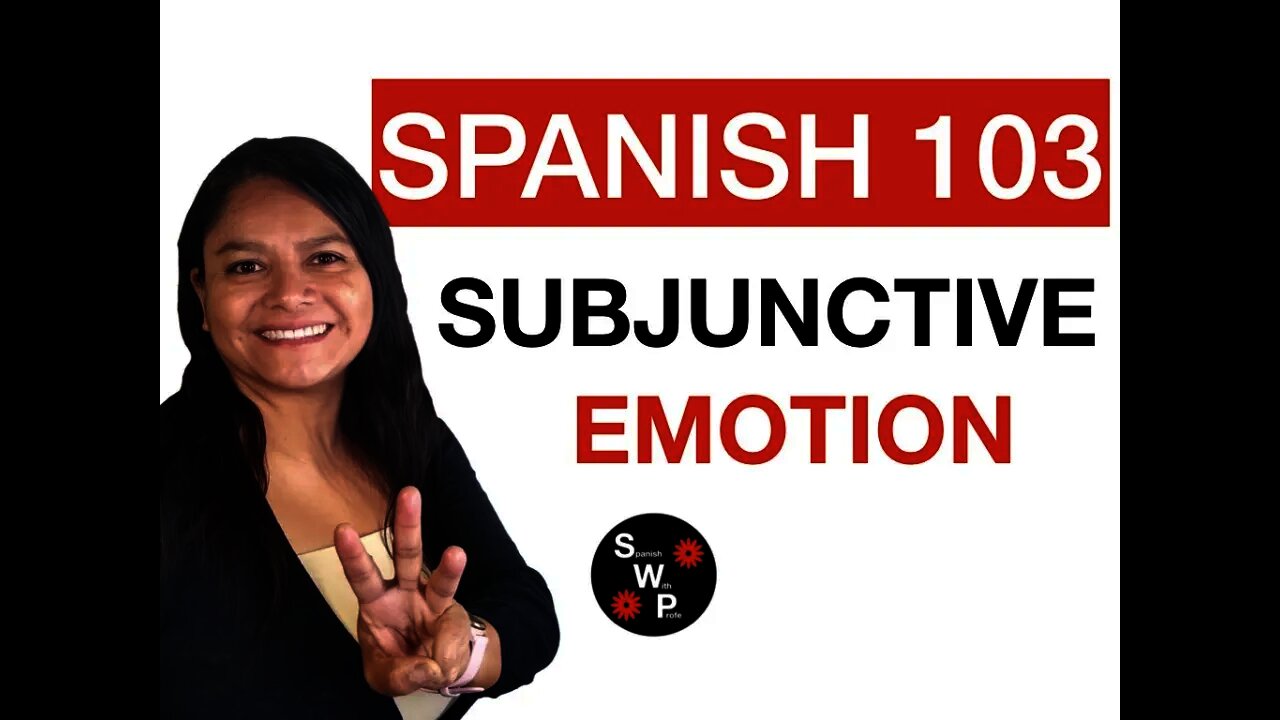Premium Only Content

Spanish 103 - Learn the Spanish Present Subjunctive with Emotions and Feelings Spanish With Profe
In this video you will learn the Spanish present subjunctive with emotions and feelings.
The present subjunctive is a mood. The subjunctive cannot stand by itself. It depends on verbs of will/want, emotions, denial, doubt, desire, impersonal expressions, negation, general expressions, God, ojalá. It happens on the subordinate clause.
To remember the subjunctive you can make use of the following acronyms: WEDDING or WEIRDO.
WEDDING=W-stands for Wish/Want/Will, E for emotion, D for desire, doubt, denial, I for impersonal expressions, and G for God; and WEIRDO=W for Wish/Want/Will; E for emotions, I for impersonal expressions, D for denial/desire/doubt, and O for ojalá.
Any time you see Ojalá you will use the subjunctive. An expression now meaning "hopefully" in Spanish comes from the Arabic "إن شاء الله - 'in sha' allh" meaning God Willing; a prayer to God/Allah. Large parts of Spain were conquer by Muslims invaders from North Africa from 711-1492AD. Only the very far northern Christian Kingdoms of the Iberian Peninsula remained independent. As a result of this 800 year occupation we have many words in Spanish that have their origin in Arabic
Verbs of emotion will require the subjunctive on the subordinate clause provided that there is a different subject.
A+ verb (emotion) + que + B + verb (subjunctive)
Temo que el gato se pierda (perder) en la nueva ciudad.
(I am afraid the cat will get lost in the new city.)
A= Yo (implied by Temo) which is a verb of feeling/emotion
B=gato
so this sentence meets the required parts of the subjunctive formula
Es terrible que algunas ciudades no reciclen (reciclar) nada.
It is horrible that some cities do not recycle at all.
A=IT (implied by Es)
B=algunas ciudades
therefore it meets the subjunctive rule
Ojalá que no llueva (llover) hoy.
(Hopefully it will not rain today.)
This expression always requires the subjunctive, you may omit the "que" if you would like.
Remember that "que" is a relative pronoun that connects two sentences together, the subjunctive happens on the subordinate clause, the one that cannot stand alone.
There are spelling changes in -car=qu; -zar=c, gar=gu, ger=j
to keep the original sound of the given verb. This will happen for all subject pronouns.
If there is no change in subject, you will need to leave the second verb in the infinitive (un-conjugated verb).
Es imposible ____(dormir).
Es imposible dormir (dormir).
It is imposible to sleep.
There is just one subject
A=It (implied by Es)
but there is no subject B
so the second verb stays in its infinitive form (e.g cocinar, beber, estudiar)
vs.
Es imposible que ellos ______(dormir) tanto.
Es imposible =A =It
Ellos = B
Es imposible que ellos duerman tanto.
This one requires the subjunctive since
we are using an impersonal expression and there is a subject B
Some Ways Below To Help Out The Channel Listed Below
► DONATIONS via PayPal (To help support the channel you can donate via PayPal): https://paypal.me/SpanishWithProfe?locale.x=en_US
► ROBINHOOD (Get 1 Stock When You Sign Up. Easy to use app for investing and you get a free stock.): https://join.robinhood.com/grants1730
► WEBULL (Get 2 Stock When You Sign Up):https://www.webull.com/activity/get-free-stocks?inviteCode=uYiu2aNdG46N&source=invite_gw&inviteSource=wb_oversea
► CRYPTO.COM Use my referral link https://crypto.com/app/e3p3g4rc9m to sign up for Crypto.com and we both get $25 USD :)
-
 1:50
1:50
Spanish With Profe
1 year ago $0.02 earnedLearn how to say pedestrian & crosswalk in Spanish. Improving your vocabulary in Spanish is so 🤩
5371 -
 17:59
17:59
Spanish With Profe
4 years agoSpanish 103 - Learn Spanish Present Subjunctive with Doubt, Denial and Disbelief Spanish With Profe
1239 -
 13:08
13:08
Spanish With Profe
4 years agoSpanish 103 - Present Subjunctive vs Indicative with Adjective Clauses in Spanish Spanish With Profe
1329 -
 12:54
12:54
Spanish With Profe
4 years agoSpanish 103 - Spanish Present Subjunctive with Verbs of Will, Want WEIRDO Part 1 Spanish With Profe
1318 -
 12:10
12:10
Spanish With Profe
4 years ago $0.04 earnedSpanish 101 - Learn Numbers in Spanish - Spanish Numbers 1-30 - Spanish With Profe
322 -
 9:48
9:48
Spanish With Profe
4 years agoSpanish 103 - Learn Spanish POR VS PARA Spanish for Beginners Spanish With Profe
25211 -
 5:19
5:19
Spanish With Profe
4 years ago $0.03 earnedSpanish 101 - Learn Spanish Family Vocabulary for Beginners - Spanish With Profe
585 -
 6:27
6:27
Spanish With Profe
4 years ago $0.03 earnedSpanish 101 - Learn Spanish ER and IR Verbs - Spanish With Profe
301 -
 5:47
5:47
Spanish With Profe
4 years agoSpanish 102 - Learn Adverbs in Spanish for Beginners Spanish With Profe
298 -
 10:43
10:43
Spanish With Profe
4 years ago $0.02 earnedSpanish 101 - Learn Spanish Irregular Verbs for Beginners - Spanish With Profe
326